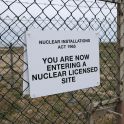
Safety assessment of passive systems for Small Modular Reactors and Micro Modular Reactors
In our own research project "Safety assessment of passive systems for SMR / MMR using the methods of deterministic safety analysis (DSA) and probabilistic safety analysis (PSA)", GRS colleagues are working on the further development of SMR analysis models. In addition to event and accident analyses on current issues, scientific and technical questions regarding reactor and plant behaviour are to be answered on this basis. The main focus is on so-called inherently safe or passive systems.
In order to gain insights into an accident scenario and to analyse its sequence deterministically, an existing thermal-hydraulics model of a so-called iPWR is being developed, using the example of an SMR from US reactor developer NuScale. An iPWR is an integral pressurised water reactor. In this concept, the components of the reactor coolant system are housed within the reactor pressure vessel, which is intended to enhance safety and reliability. In addition, our colleagues can test the capabilities of GRS's own simulation code package AC2 for advanced pressurised water reactors in the course of this work and on the basis of the accident simulations carried out. AC2 can be used to simulate events and accidents in nuclear reactors across all systems.
The researchers will then use the results of these deterministic analyses to further develop an existing level-1 probabilistic safety analysis base model (considers the course of the accident from the initiating event to the unlikely case of core damage). The PSA model will be used to analyse reliability data of selected SMR components and to validate previous model assumptions.
The aim is to derive possible release scenarios on the basis of the analyses carried out and to assess the effectiveness and balance of the plant's safety concept.
As regards Micro Modular Reactors (MMR), the work focuses on possible safety risks due to transport processes, external influences on a transportable Micro Reactor, and the derivation of exemplary source terms.
Background on PSA and DSA
Safety analyses of nuclear power plants can basically comprise deterministic (DSA) and/or probabilistic (PSA) analyses of accident sequences.
A deterministic safety analysis is the analysis of the safety-related status of a plant or of a plant component. A deterministic analysis is carried out with a single set of parameters or starting and boundary conditions and provides a best-possible or conservative estimate of system behaviour. A system evaluation and a status or event analysis are used to determine whether the safety requirements are fulfilled.
In the case of a probabilistic safety analysis, on the other hand, the safety-related condition of a plant is analysed by determining the frequency of hazard or core damage states or the frequency of the release of radioactive materials. The results can then be used e.g. to make decisions on retrofitting or other improvements to the plant.
Project highlights Reactor Safety

Many countries expect Small Modular Reactors (SMRs) to play their part in helping them become less dependent on fossil fuels for electricity generation. However, most SMR concepts are still at different stages of development. While safety aspects already play a role from the first sketches of ideas, security measures (required protection against malicious acts) are often only given a secondary role. Therefore, in a research project that has just started, GRS is dealing with the characteristics of physical protection and computer security of different SMR concepts and to what extent security requirements and concepts of conventional nuclear facilities can be applied to SMRs. In this way, GRS wants to build up expertise and identify open questions in the application of existing rules and regulations.